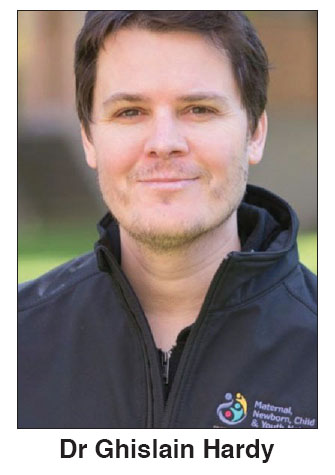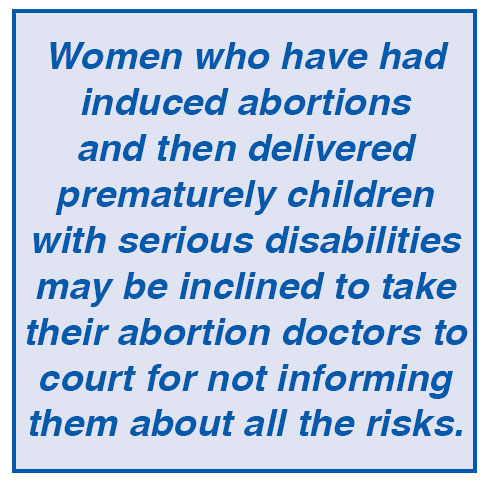Autism: the tragic aftermath of abortion by Brent Rooney and Rodney A. Clifton
Prematurely-born babies face a much higher risk of autism than babies born full-term, according to a team of Australian medical researchers.
One in 66 Canadian children under age 18 years has autism. In 2019, gutsy researchers in China revealed in a peer-reviewed study that children of Chinese mothers with induced-abortion history have double (or, more precisely, 2.07 times) the odds of having autism.1
In 2018 it was established as medical fact by a team of
Western Australian researchers, led by Sachin Agrawal, in a
"study of studies" (that is, a meta-analysis) that prematurely born
babies face raised autism risk.2 They computed the risk to
be 7%, which is about 6.5 times the autism risk of a Canadian baby born full-term.
baby born full-term.
This "study of studies" provides the most convincing evidence, pro or con, about a suspected medical risk. The four "studies of studies" for preterm delivery risk for children of mothers with induced abortion history all confirm raised preterm birth risk.
In China, under its one-child-policy, informed medical consent was never in force. In Canada, women are not informed on induced-abortion consent forms about future raised risk of a premature delivery of a baby. So informed medical consent is denied young pregnant women in Canada.
To reduce the future horrendous costs of autism, China and Canada must warn young women about raised future autism risk to new-born babies if they undergo induced abortions. Autism is hugely expensive, both emotionally and financially. (There are many autism risk factors, and being prematurely born is one of them).
"Preemies" are babies that are born prematurely. This fact is generally well known. It is also relatively well known that preemies have an increased risk of having many serious health problems: autism, blindness, cerebral palsy, deafness, epilepsy, serious infections and mental retardation. Often, these are permanent disabilities requiring substantial care at great expense. Preemies also have a higher than average risk of infant death.
As a consequence, expectant mothers would, if at all possible, try to avoid giving birth to premature babies. But many young women don't seem to realize that if they have had one or more induced abortions, they have substantially increased their risk of delivering premature babies in future pregnancies. Sadly, Canadian informed medical consent (IMC) forms that women sign before receiving an abortion do not tell them about the risks they will potentially face.
A meta-analysis is an examination of a number of research studies and is a sophisticated way of summarizing the results of these studies. All four of the abortion-preemie meta-analyses confirm that a woman with induced abortion history faces future raised risk of a premature delivery of a baby.
Generally, one induced abortion increases the preemie odds ratio by 36 per cent (odds ratio = 1.36), and two or more induced abortions almost doubles the odds ratio (odds ration = 1.93). The University of Toronto's Dr Prakesh Shah is the lead author of the October 2009 meta-analysis published in the very prestigious British Journal of Obstetrics and Gynaecology.3
The next step is to understand that premature babies have a substantially increased risk of having serious medical problems. A 2008 meta-analysis shows that preterm babies born at less than 28 weeks have 129 times the risk of having cerebral palsy, and babies born between 28 and 31 weeks' gestation have 55 times the risk of having cerebral palsy than full-term babies.4
Canada has a birth rate of about 375,000 per year, with a premature birth rate of about 7.5 per cent, which means that around 28,000 premature babies are born each year. And there are about 160 babies born later diagnosed with autism from women who have previously had one or more induced abortions.
In 2007 Harvard professor Michael Ganz estimated the lifetime cost of raising an autistic child at about US$3.2 million.5 Even if the Canadian cost is only one half that cost, that still represents about $1.6 million per child, which adds an increased cost on a family that is already struggling.
Cerebral palsy risk
In 2013 Montreal's McGill University doctor professors, led
by Dr Ghislain Hardy, in a peer-reviewed study, revealed the
odds of early preterm delivery (under 32 weeks' gestation) for
Quebec women with induced-abortion history.6 Quebec women
with exactly one prior induced abortion increase their odds of
early preterm delivery by 45%, but those with more than one
prior induced abortion increase their early "preemie" odds by
73%.
Babies born early preterm have on average 55 times the cerebral palsy risk as babies born full-term. So, induced abortion history is causing excess cerebral palsy cases in Quebec children. And all the other adverse risks faced by "preemies" are in play (autism, mental retardation, blindness, deafness, infant death, etc.).
Because of the relatively strong relationship between induced abortion, subsequent premature births, and children who are born with serious disabilities, Canadian informed medical consent forms should include all of the risks factors that women considering an induced abortion are likely to face in the future. Perhaps women who have had induced abortions and then delivered prematurely children with serious disabilities will be inclined to take their abortion doctors to court for not informing them about all the risks they faced.
Some countries have gone further than warning women about the risks of induced abortions. Poland, for example, banned most abortions, except where the health of the mother is in danger or when a woman has become pregnant after a rape.
As a result, the number of children born with serious disabilities, autism and cerebral palsy, for example, have substantially decreased in Poland. The premature deaths of babies and maternal mortality have also decreased. Poland was somewhat slow in implementing its restriction law. Nevertheless, between 1989 and 1994, the number of abortions yearly dropped by 98.5%.
Poland is mostly a Catholic country. It is hard to imagine other European countries, not strongly Catholic, enacting such stringent abortion access laws.
Canada is not likely to severely restrict access to abortions as Poland did, but at least more could be done to inform women who are about to be given an abortion that they will increase their risk of having premature deliveries in the future, and that premature babies are much more likely to have serious disabilities.
A second major induced-abortion adverse side-effect is raised maternal breast cancer risk. The older a woman is at her first full-term pregnancy, the higher her lifetime breast cancer risk.
 According to Harvard University researchers, each year that a
young woman postpones her first full-term pregnancy increases
her relative breast cancer risk by 3.5% (compounded).7 Thus, if
24-year-old "Alice" has an induced abortion of her first pregnancy,
but has a full-term delivery of her second pregnancy as age 34,
"Alice" has increased her relative breast cancer risk by 41%.
According to Harvard University researchers, each year that a
young woman postpones her first full-term pregnancy increases
her relative breast cancer risk by 3.5% (compounded).7 Thus, if
24-year-old "Alice" has an induced abortion of her first pregnancy,
but has a full-term delivery of her second pregnancy as age 34,
"Alice" has increased her relative breast cancer risk by 41%.
The top three killers of women between ages 17 and 35 years are: accidents (#1 by far), homicides, and suicides. For induced abortion to be safer for pregnant women, abortions would have to cut the risk of at least one of the three top killers. Induced abortion does not lower the risk of any of the top three killers. In studies that include all possible causes of death (i.e., not limited to "maternal mortality"), pregnant women who choose abortion have higher total death risk than women who deliver babies.
Informed medical consent?
I (Brent Rooney) have a copy of a British Columbia abortion
clinic consent form for vacuum aspiration (that is, "suction")
abortion. And as many such "suction" abortion consent forms
do, it warns about the risk of "laceration of the cervix". The
cervix is the "gate" to a woman's womb and if the cervix is
lacerated, it is at much raised risk of opening too early in a future
pregnancy, leading to a premature delivery of a baby.
But nowhere on this British Columbia "suction" abortion consent form can be found a warning about future raised risk of premature delivery of a baby. But even if future induced abortion consent forms are honest and have complete disclosure of risks, and a woman consents to the abortion, does that mean her abortion is necessarily legal? Most Canadians will be surprised that the answer is no.
Judge Ellen I. Picard is the lead author of the authoritative textbook, Legal Liability of Doctors and Hospitals in Canada. In the third edition of the textbook Judge Picard wrote: "However, this does not mean that the doctor has a duty to provide (and the patient a correlative right to receive) whatever treatment the patient may request.
"If a patient requests treatment which the doctor considers to be inappropriate and potentially harmful, the doctor's overriding duty to act in the patient's best interests dictates that the treatment be withheld.
"A doctor who accedes to a patient's request (or demand) and performs treatment which he or she knows, or ought to know, is
contra-indicated and not in the patient's best interests, may be
held liable for any injury which the patient suffers as a result of
the treatment."8
performs treatment which he or she knows, or ought to know, is
contra-indicated and not in the patient's best interests, may be
held liable for any injury which the patient suffers as a result of
the treatment."8
So how many Canadians infused with common sense think that an elective (i.e., unnecessary) medical treatment that raises a woman's future risk of premature delivery and boosts breast cancer risk for a woman is anything other than strongly contra-indicated?
Increased autism prevalence in China is a logical aftermath of China's "one-child policy". If Canada wants to curtail autism prevalence, public health officials will warn young women about the "abortionpreemie" risk.
The evidence is overwhelming that induced abortion boosts a woman's future risk of premature delivery of babies. Those who deny this need to cite at least one "study of studies" that clears induced abortion history of significantly raising future preterm delivery risk.
Brent Rooney, MSc, is the research director at the Reduce
Preterm Risk Coalition in Vancouver, Canada.
Rodney A. Clifton, B.Ed., M.Ed. (Alberta), PhD (Toronto),
Fil. Dr. (Stockholm), specialises in the sociology of
educational policy. He is a professor emeritus at the
University of Manitoba, Winnipeg, Canada, and a senior
fellow at the Frontier Centre for Public Policy, a Canadian
public policy think tank.
![]()
